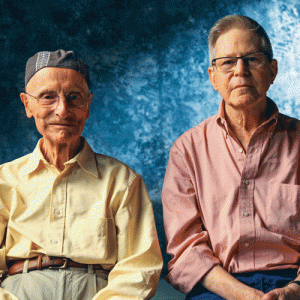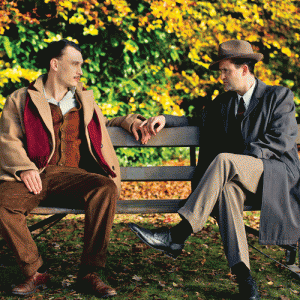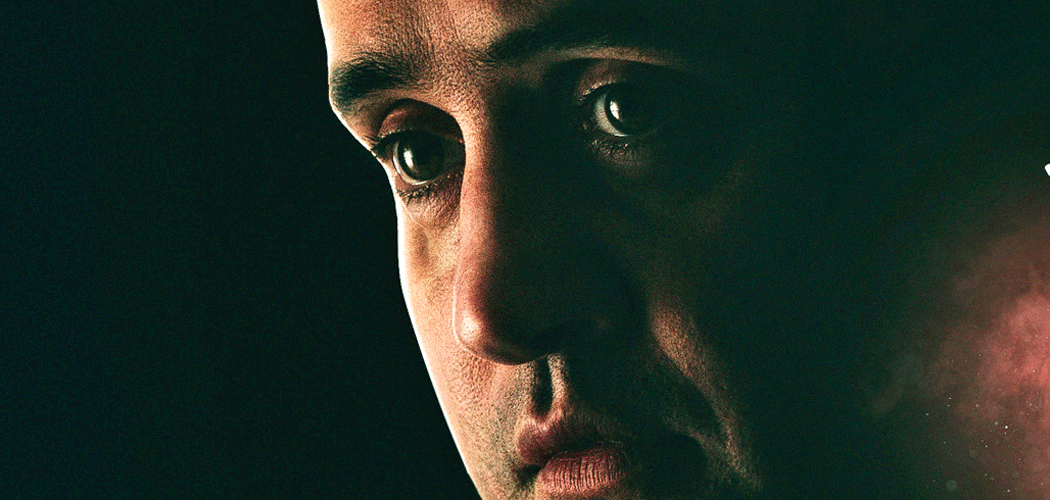Roger Lockyer, 89, and Percy Steven, 78, have been together 51 years and were the first gay couple to be civilly partnered in England and Wales when the Civil Partnership Act 2004 came into force on 21 December 2005. They also appear in BBC Two film Against The Law, which airs this Wednesday (26 Jul). Luke Till hears some of their tales.

When and where were each of you born?
R: I was born the 26th November 1927 in London.
P: And I was born in Johannesburg, South Africa, on the 5th January 1939.
And when did you each realise you were gay?
R: I can’t ever remember not knowing.
There was always something different?
R: Yes.
P: Did you know that when you were junior school?
R: Yes. It’s an awfully long time ago, but I always knew I preferred boys to girls.
And you, Percy?
P: Well I knew at a young age. I remember when I was about eight or nine being in love with this boy in my year, Alan, and he lived quite close to me. And we used to walk home from school, and he would walk me home and his home was another two blocks away. And sometimes I would go with him and walk him home, and then he’d walk me halfway back [laughs]. I mean it was silly, but we never ever said, “I love you”, but I think we both had this great fondness for each other.
How did you come out and at what age?
R: I never came out. They took it for granted I was gay, so I didn’t have to announce anything. And then I went into the Navy for my National Service, and the Navy was just fantastic. There it was a question of whether you weren’t gay. And then from there to Cambridge, and Cambridge was going through a very, very gay period. And I remember a friend of mine – an absolute charmer, who was heterosexual – he said to me almost in tears, “I think there’s something wrong with me.” And I said, “What’s the matter Douglas?” And he said, “Well, I don’t like men in the way that you all do. Do you think there’s something wrong with me?” And I said, “No, no, you’re alright, Douglas.”
What about you, Percy?
P: I had this very close friend, Jeffrey, and my family knew his family reasonably well, and vice versa. So I told Jeffrey and he said, “I’m exactly the same!” We must’ve been 15 or 16. And Jeffrey had a cousin who was maybe six or eight years older than us, and he ran a rather fine jewellery shop in Johannesburg, and he took us to a gay club, and it was my first introduction to a gay club. And I couldn’t believe there were all these other people who were like me! So that was rather fun. And it was also very exciting because it was against the law, so you had to sign in to get into the club. And if the police raided someone would shout “The police are here, get out through the back door!” And we’d all scuttle out, just a few would be left sitting there having a quiet drink while the police had a look around. And then we’d all pile back in.
Did you ever tell your parents?
P: No, but my mother came to stay with us for three months one year, which was sort of interesting. Roger was away in Oxford doing some research for a book he was writing, and at the time we had a rather sweet house in Chiswick. My mother arrived and so I showed her around: “This is Roger’s and my bedroom, this the bathroom, and this is the guest room.” And she said, “Yes, your bedroom.” And I said, “No, this is the guest room.” She said, “Yes I know darling, you’re sharing with Roger because I’m here.” I said, “No…” And she said, “Oh.” So I said, “Do you want a cup of tea or do you want a scotch?” And she said, “I think I’ll have the scotch.”
And what was your age then?
P: I was then about 28. And Roger came back from Oxford and I said, “My mother knows.” And he met my mother and they got on like a house on fire, there was no problem whatsoever. In fact you got on better with her than I sometimes did.
R: Yes.
Great that you all got along.
P: Yes it was. I don’t think it worried her, really.

How were gay men regarded within society in the 50s and 60s?
R: In the 50s in society as a whole there was very little comprehension. It’s very difficult to realise that homosexuality was a completely taboo subject. Even the expression of it was a genuine taboo. It was simply something that was never mentioned. And a few brave spirits tried to break the spell by mentioning it and bringing it into the light of day. But it was a very, very slow process. And that’s why the Peter Wildeblood case was so important because it resonated; everybody was reading about it. And this taboo subject that dreaded even mentioning, suddenly everyone was talking about it. It did an enormous power of good, from that point of view. So at last a sort of discussion began. And that led ultimately to the setting up of the Wolfenden Commission and then of course the relaxation of the law. But it never occurred to me for a moment that that would happen. I thought England would not change.
P: But even in the 60s, when I came to England, yes there was a gay life with all these wonderful clubs one could go to in the West End, but you always still took care. So although in the 60s, after the law changed, you were less fearful, you always knew you were running a risk that you could be arrested.
What were some of the gay venues you could go to before the law changed in 1967?
R: There was The Coleherne in Earl’s Court. The Salisbury on St Martin’s Lane.
P: The Spartan, which I never went to. And there was one in Soho on the first floor…
R: The A and B.
P: And then there was a very grand one…
R: The Rockingham. It was known as ‘the gentlemen bugger’s club’ and it had writing paper…
P: And you had to wear a tie! You couldn’t go with an open-necked shirt. And you had to wear a jacket.
And where was The Rockingham?
P: Behind Leicester Square. And it had rather fine rooms where you could have a drink. And there was Napoleon’s on Bond Street, which was very smart but casual. And there was a gay restaurant by World’s End. And then suddenly, after ’67, it didn’t have that thrill about it.
When the law changed, how long did it take to see significant change in the way society treated you?
R: Well it was a very limited reform. The law only applied to two consenting men over 21 having sex in private.
And only in England and Wales too.
R: That’s right. So it was at least ten years until attitudes started fundamentally changing.
P: And if you had three or more people just having a party, and suddenly it developed into a sex session of some sort, that was illegal, and the police could arrest you and you would be sent to jail. And that did happen.
Do you know when the law changed further so that that was no longer illegal?
P: That’s an interesting question. I don’t know when that happened.
R: No, I don’t remember.
P: I don’t know when it became legal for more than two men to have a sex party. But of course for heterosexuals – there was that famous one, they were all fucking everybody… The Christine Keeler one…
The Profumo affair.
P: Yes! Well, that was OK. But if that had been all men, they would’ve landed up in jail. And of course it didn’t apply to women, because there’s never been an act against lesbians. So it was a very strange period.
So lesbians could have an orgy…
P: Yes. And they did!
R: Do lesbians have orgies?
P: Yes because Susan once said, “Oh we’re just having an orgy…” About three or four of them.
R: Oh really?
Well today, LGBTQ+ people in the UK have more rights than ever before. You mentioned, Roger, that back in the 1950s even the word ‘homosexual’ was taboo, but today you two are married. When you were young men, did you ever think we’d get to this stage?
R: I thought it would never be a reality. England was unbelievably stuffy! I only have to think of my own parents; I’m not even sure they understood what homosexuality was, I very much doubt it. And so it seemed to be inconceivable. I never even wasted time thinking whether that would change. And even now, I’m gobsmacked. It’s amazing.
But on the whole I think the British public is very accepting. And I think it was at the Q&A after the press screening for Against The Law, someone said that once Wildeblood was released from prison and he went back to his house in Islington, his neighbours had put out flags and ‘Welcome home’ signs for him.
R: Yes! Wasn’t that lovely? I never knew about that. It reminds me of the actor Sir John Gielgud who was performing in the West End at the time, and he was arrested by the police one afternoon for chatting up somebody.
P: He was cottaging!
R: OK, he was cottaging. And he was terrified because his name was revealed – which it shouldn’t have been – and he appeared before a magistrate and so it hit the papers the next morning. And so that night he was going to perform and he said, “I can’t go on, I’m a bag of nerves…”
Because he thought he was going to be jeered?
Yes, booed off the stage. And he was told, “You’ve got to go on, John. You’ve got to go on.” So he went on and the entire audience rose to it feet and clapped.
P: A moving story.
R: And so I think you’re right, the public are very accepting.
And they touched on this in the film also: the public attitude had shifted before the Wolfenden Committee was set up. People were reading about the Wildeblood case in the newspapers for a number of days and almost thinking, ‘Well so what?’
P: I think that’s absolutely right because when we were in France – we had a house in the countryside there for 20 years where we would spend five months of the year – and the villagers were always friendly. We used to go to the annual feast and we were just part of that community. And I think the same thing in England: people knew but they thought, ‘So what?’
R: It would be very interesting for a sociologist to trace the change in attitudes before any formal change, because I think you’re quite right: attitudes were changing and the world caught up.
And finally, what was it like for you to take part in the making of Against The Law?
R: It was wonderful. We got to know Fergus [O’Brien], and we think Fergus is fantastic, as a person and as a director. It was most exciting. And it was fantastic to meet our contemporaries who had slightly different experiences.
See Roger and Percy in Against The Law this Wednesday (26 Jul) at 9pm on BBC Two. It will be available on the BBC iPlayer afterwards too.














